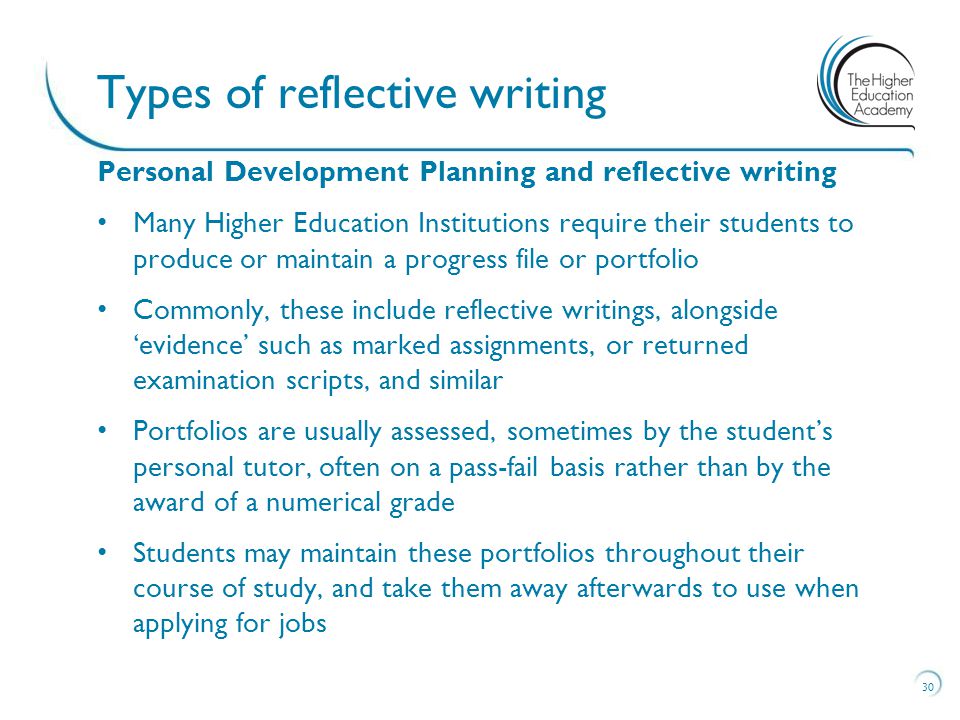
Reflective writing is: documenting your response to experiences, opinions, events or new information; communicating your response to thoughts and feelings; a way of exploring your learning; an opportunity to gain self-knowledge; a way to achieve clarity and better understanding of what you are learning; a chance to develop and reinforce writing skills Tips. Reflective writing is more personal than other types of academic writing. You can use the first person (I , My , etc.) and explain how you felt. Think about the experience in detail. Explain what went well and what was challenging, and say what you learned in the process. Use a structure: Short introduction to the situation 4/3/ · Remember that reflective writing has a descriptive component and so must have a wide range of adjectives to draw from. Avoid vague adjectives such as ‘okay’ or ‘nice’ as they don’t really offer much insight into your feelings and personality. Be more
How to Write a Reflective Essay: Format, Tips and Examples | EssayPro
Aim to be descriptive in your use of language. You should use imagery, sentence structure and other techniques to bring your writing to life. Pay particular attention to describing your thoughts and feelings about the event, experience, person or thing.
Describe your emotions and reactions from the time it took place and from your perspective, reflective writing tips, to prove you have thought about it and are able to reflect upon it.
Remember your audience. You will probably write about something from your own experience but the reader will be irritated if you keep writing in the first person "I went""I did""I saw""I got" without pausing to put across something more meaningful. Try to make the reader share in the experience or feeling you are trying to describe. Make good use of description to create a vivid impression of the experience or feeling rather than simply listing what happened.
Write your essay with an overall emotion or theme in mind - happiness, excitement, fear, sorrow reflective writing tips and plan the language and structure to match. Don't weaken the impact of your writing by including boring details, reflective writing tips. If it's not going to add to the feeling or insight you want to create, why put it in? There should always be a sense of development.
You need to think about how the experience has changed you or others. You might consider what you have learned about yourself, how you have changed and what you could have done differently.
Statements such as, 'At the time', 'Looking back', and 'I can see now' can start the reflective thinking process. They don't really tell us how you felt about something, and they do not reflect your personality. Don't forget to check your spelling, punctuation and sentence and paragraph structures.
Personal writing is a popular choice but you must reflect on the experience before you write. This should help you to avoid a boring account of events. Change language Reflective writing tips Cymraeg Gaeilge Gàidhlig.
Reflective writing tips Aim to be descriptive in your use of language. Higher Subjects Higher Subjects up, reflective writing tips.
Reflective writing
, time: 6:2810+ Reflective Writing Tips and Examples - PDF | Examples

Reflective writing is: documenting your response to experiences, opinions, events or new information; communicating your response to thoughts and feelings; a way of exploring your learning; an opportunity to gain self-knowledge; a way to achieve clarity and better understanding of what you are learning; a chance to develop and reinforce writing skills Tips. Reflective writing is more personal than other types of academic writing. You can use the first person (I , My , etc.) and explain how you felt. Think about the experience in detail. Explain what went well and what was challenging, and say what you learned in the process. Use a structure: Short introduction to the situation 4/3/ · Remember that reflective writing has a descriptive component and so must have a wide range of adjectives to draw from. Avoid vague adjectives such as ‘okay’ or ‘nice’ as they don’t really offer much insight into your feelings and personality. Be more

No comments:
Post a Comment